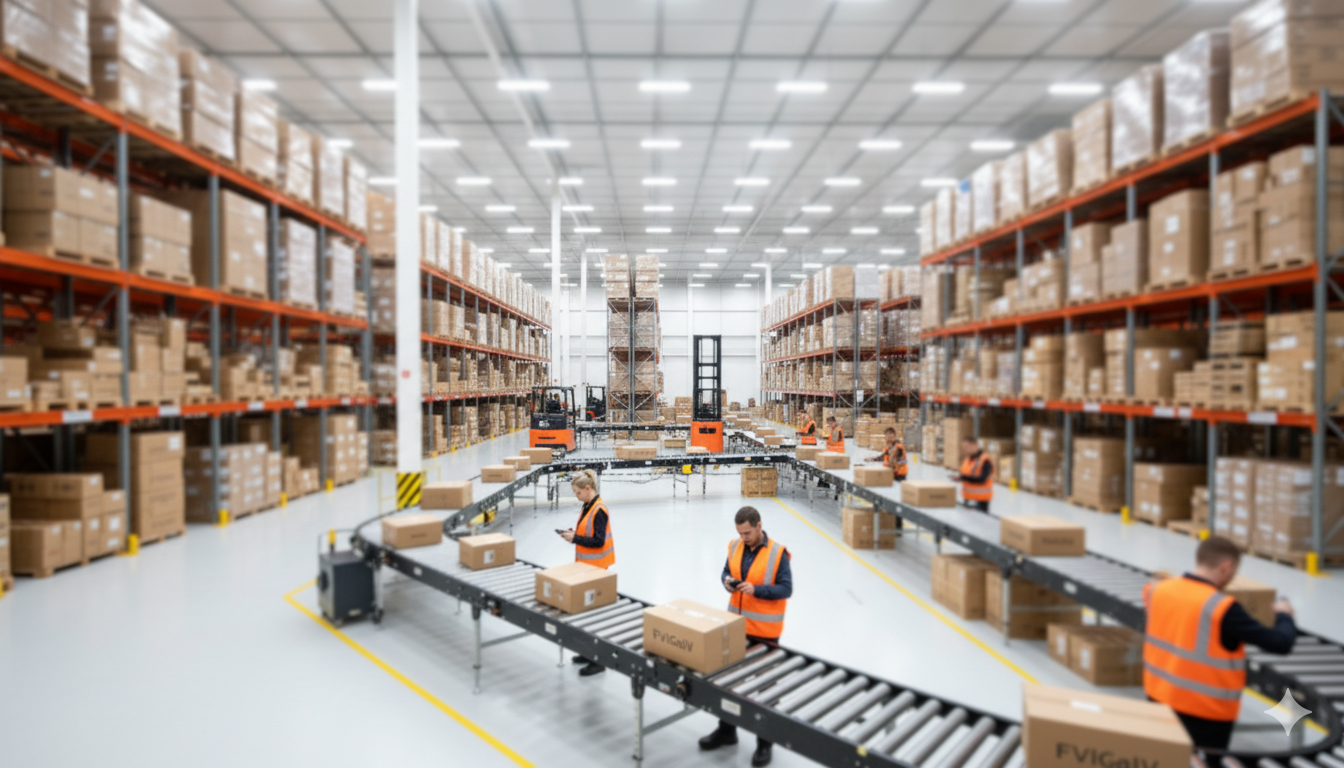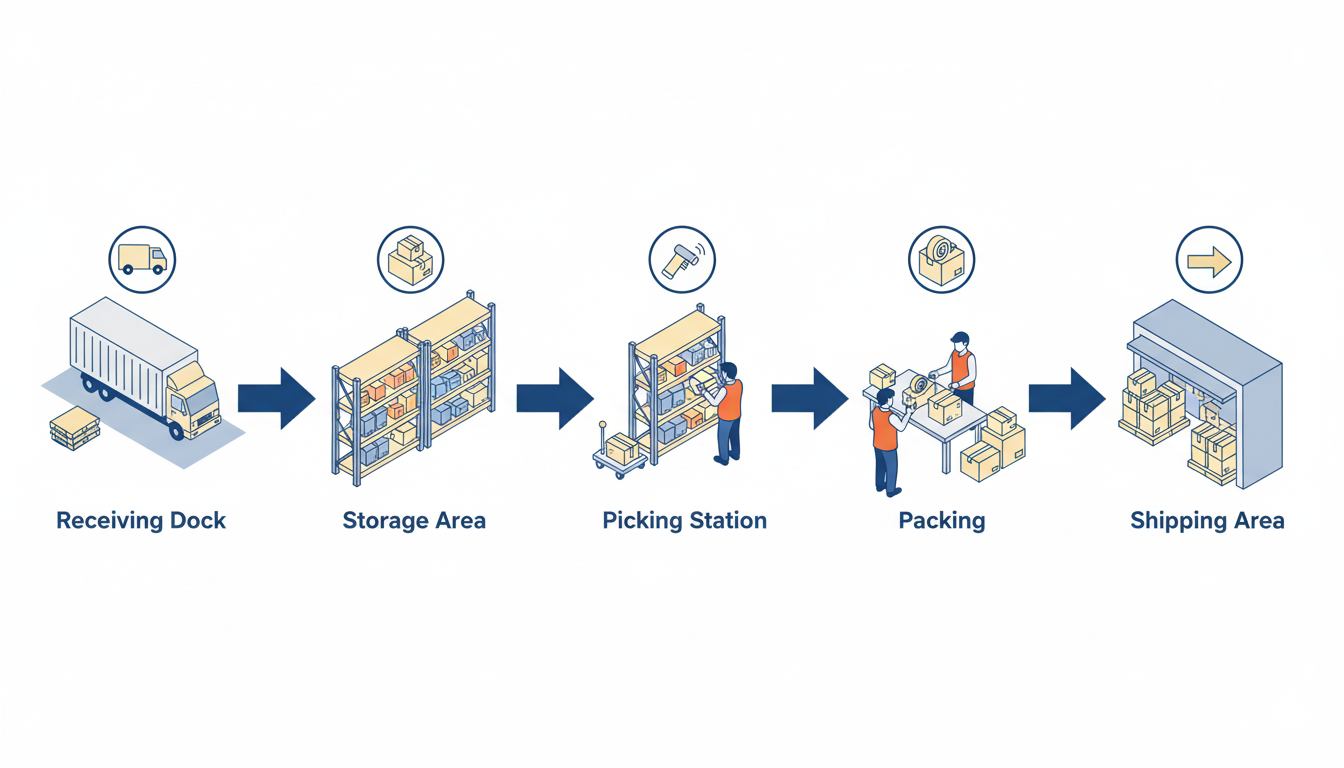Your online store just had its best sales day ever. Congratulations! But as the orders pile up, excitement can quickly turn to stress. How will you get hundreds of packages out the door on time? This is where a fulfillment company becomes your most important partner.
Fulfillment companies are the operational engine behind successful e-commerce brands. They handle the entire process from the moment a customer clicks “buy” to the moment the package arrives at their door. Choosing the right fulfillment partner can define your brand’s reputation, improve customer satisfaction, and give you the freedom to focus on growing your business instead of packing boxes.
This guide will walk you through the different types of fulfillment solutions. We’ll explain how they work, what they cost, and how to choose the right one for your brand’s unique needs.
Understanding the Role of a Fulfillment Company
So, what kind of company is fulfillment? At its core, a fulfillment company is a specialized partner that manages your inventory and ships your orders. Think of them as an extension of your team, dedicated to handling the logistics of your business so you don’t have to.
Unlike a standard shipping carrier that just transports packages, a fulfillment provider offers a complete suite of services. At Evolution Fulfillment, we serve as a strategic partner that manages the entire journey of an order. Our role includes:
- Receiving and Storing Inventory: We accept your incoming product shipments and store them safely in our secure facilities.
- Managing Your Stock: Our systems track every item, ensuring you know exactly what you have on hand in real time.
- Processing Orders: When an order comes in, we pick the correct items from the shelves.
- Packing and Shipping: We package the products, select the best shipping carrier, and send the order on its way to the customer.
- Handling Returns: We also manage the returns process, inspecting items and restocking them for future sales.
By partnering with a company like Evolution Fulfillment, you gain access to professional-grade logistics without the massive investment in building your own warehouse and hiring a dedicated staff.
Key Fulfillment Models Explained
The world of fulfillment isn’t one-size-fits-all. Different models exist to serve businesses at various stages of growth. Let’s break down the most common types.
Third-Party Logistics (3PL) Providers
The most comprehensive solution is a third-party logistics (3PL) provider. What is a third-party fulfillment service? It’s a partnership where a company like Evolution Fulfillment takes over your entire supply chain, from inventory management to final delivery. This allows you to hand off the operational complexities of your business and focus on what you do best: developing great products and marketing your brand.
A modern 3PL provider integrates seamlessly with your e-commerce store. Key benefits include:
- Scalability: Effortlessly handle a sudden surge in orders during holidays or promotions without missing a beat.
- Expertise and Technology: Gain access to advanced warehouse management systems (WMS), optimized picking routes, and established relationships with shipping carriers for better rates.
- Focus on Growth: Free up your time and capital to invest in product development, marketing campaigns, and customer service.
For brands looking to expand, especially into new markets like North America, a 3PL provides the local infrastructure and know-how to compete effectively from day one.
Fulfillment Centers vs. Traditional Warehouses
People often use the terms “warehouse” and “fulfillment center” interchangeably, but they serve very different purposes.
A traditional warehouse is primarily for long-term storage. It’s a static place to hold inventory with minimal movement.
So, what is a fulfilment warehouse or center? It’s a dynamic, active hub designed for speed and accuracy. At Evolution Fulfillment, our centers are built around technology that powers e-commerce.
|
Feature |
Traditional Warehouse |
Modern Fulfillment Center |
|---|---|---|
|
Primary Goal |
Static, long-term storage |
Active processing of orders |
|
Operations |
Infrequent movement of goods in bulk |
Constant picking, packing, and shipping |
|
Technology |
Basic inventory tracking |
Integrated systems for real-time data |
|
Focus |
Storing products efficiently |
Getting orders to customers quickly |
Modern fulfillment centers use sophisticated software to sync with your online store, ensuring inventory counts are always accurate and preventing you from selling out-of-stock items. This technological advantage is crucial for providing a smooth customer experience.
Dropshipping
Dropshipping is a fulfillment model where you sell products you don’t actually own. When a customer places an order, you pass it along to your supplier, who then ships the product directly to the customer.
Advantages:
- No need to invest in inventory.
- Low startup costs and financial risk.
- Ability to offer a wide variety of products.
Disadvantages:
- Less control over shipping times and quality.
- Lower profit margins.
- Managing customer service for shipping issues can be difficult.
Dropshipping can be a great way to test new products or markets. At Evolution Fulfillment, we sometimes help brands use dropshipping as a strategic tool to validate demand in North America before they commit to holding inventory here.
Hybrid Fulfillment Models
A hybrid model mixes in-house fulfillment with outsourced services. This strategy gives you flexibility and control. For example, a business might handle its own local deliveries while partnering with a 3PL like Evolution Fulfillment to manage national or international shipping.
Another common hybrid approach is to manage core, high-margin products yourself while outsourcing seasonal or high-volume items. This allows you to maintain direct control over key products while leveraging a partner’s efficiency for others. This flexible strategy is perfect for businesses with fluctuating demand or unique product needs.
Core Services Offered by Fulfillment Companies
A true fulfillment partner offers much more than just storage and shipping. Their services are designed to support your entire operation.
- Inventory Management: Advanced systems provide real-time visibility into your stock levels, track product movement, and even automate reorder alerts to prevent stockouts. This includes specialized protocols like first-in, first-out (FIFO) to manage products with expiration dates.
- Order Processing and Shipping: Once an order connects to our system, our team uses optimized workflows to pick items accurately and pack them securely. We leverage relationships with multiple carriers to find the most cost-effective and reliable shipping option for every package.
- Returns Management (Reverse Logistics): Handling returns can be a major headache. A fulfillment partner streamlines this process, inspecting returned items, restocking them if they meet quality standards, and keeping the customer informed. A smooth returns experience can turn a disappointed customer into a loyal one.
- Value-Added Services: Many fulfillment companies offer services that help your brand stand out. At Evolution Fulfillment, we provide kitting (bundling multiple items into one package), custom gift wrapping, subscription box assembly, and branded packaging to create a unique unboxing experience for your customers.
Technology: The Engine of Modern Fulfillment
Technology is what separates a basic storage provider from a high-performing fulfillment partner. Seamless integration is non-negotiable for an e-commerce brand.
A top-tier partner like Evolution Fulfillment offers:
- E-commerce Platform Integration: Pre-built connections to major platforms like Shopify, WooCommerce, and Amazon ensure that orders flow automatically from your store to the fulfillment center.
- Inventory System Syncing: Real-time data exchange between your systems and the fulfillment center’s WMS guarantees accurate stock levels across all your sales channels, preventing overselling.
- API-Based Connections: For businesses with custom-built systems, a flexible API allows for tailored integrations, ensuring all your technology works together harmoniously.
This level of connectivity gives you a complete, real-time view of your operations, from inventory levels to order status, empowering you to make smarter business decisions.
How to Choose the Right Fulfillment Partner
Selecting a partner is a major strategic decision. Here are key factors to consider.
- Your Business Stage and Goals: Are you a startup shipping 50 orders a month or an established brand shipping 5,000? Your order volume, growth plans, and budget will influence your choice. Look for a partner that can scale with you.
- Geographic Focus: Where are your customers? If you’re expanding into a new country, a partner with a local presence is essential. For brands entering Canada or the broader North American market, Evolution Fulfillment offers the infrastructure and expertise to ensure fast, affordable shipping and compliance with local regulations.
- Control vs. Efficiency: How much control do you want over the customer experience? Some brands want highly customized packaging for every order, while others prioritize speed and cost. Find a partner whose capabilities align with your brand’s priorities.
- Technology and Integration: Does the provider integrate easily with your existing e-commerce platform and other software? Ask for a demo and confirm they can support your technical needs.
- Cost Structure: Fulfillment pricing typically includes several components: initial setup fees, storage costs (per pallet or bin), pick-and-pack fees (per order or item), and shipping costs. Request a detailed quote and ensure you understand all potential charges.
Frequently Asked Questions (FAQ)
1. What kind of company is fulfillment?
A fulfillment company is a service provider that manages the entire order process for other businesses, primarily e-commerce brands. Their services include receiving inventory, storing it, picking and packing orders, and coordinating shipment to the end customer.
2. What is a fulfilment warehouse?
A fulfillment warehouse, or fulfillment center, is an active operational hub designed to process and ship online orders quickly and accurately. Unlike a traditional warehouse used for static storage, a fulfillment center uses technology and streamlined workflows to manage a high volume of individual orders.
3. What is a third-party fulfillment service?
A third-party fulfillment service (3PL) is a comprehensive partnership where a business outsources its entire logistics operation. The 3PL provider handles everything from inventory management and order processing to shipping and returns, allowing the business to focus on core activities like marketing and product development.
Ready to scale your business with the right fulfillment partner? Optimize your logistics for the Canadian and U.S. markets with Evolution Fulfillment’s expert warehouse services. Explore our solutions and build your strategy for sustainable growth today! https://evolutionfulfillment.com/

